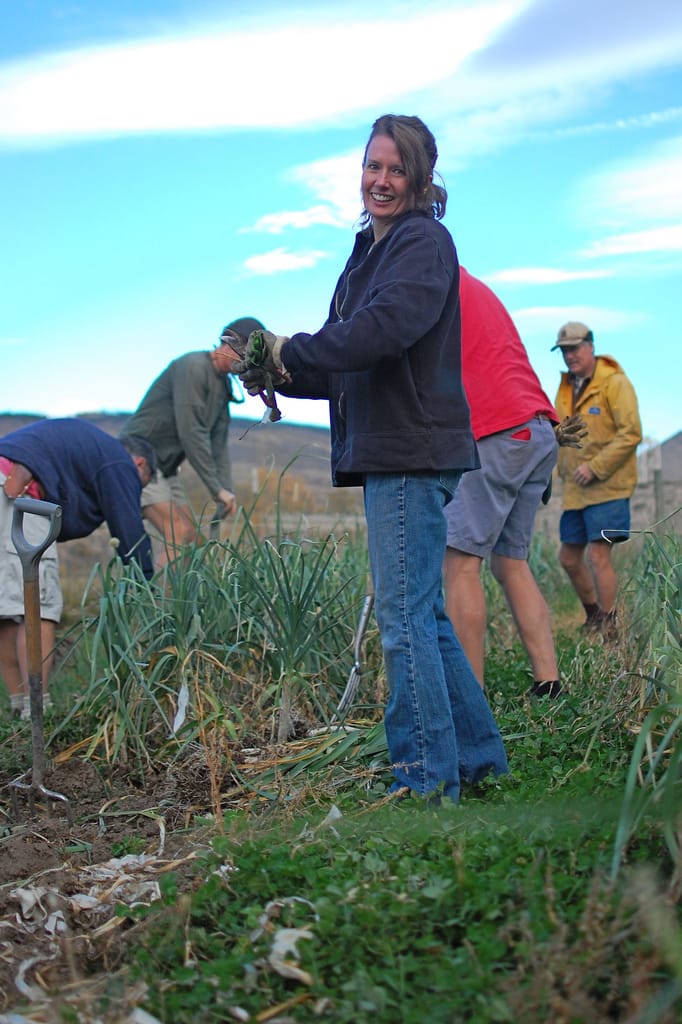[A version of this story originally appeared in The Cultivator, The Cornucopia Institute’s quarterly print publication available to members and online.]
 |
Stonebridge Farm CSA |
Is the “C” in Community Supported Agriculture Slipping?
By Steven McFadden
By now we have well over 8,500 CSA farms in the USA, according to national databases. Community Supported Agriculture (CSA) is serving hundreds of thousands of families in urban and suburban communities, and also in some rural locales. Many thousands more such community farms are at work in Canada and globally, weaving people together with the land and their food.
Yet across the US, many rural regions are “food deserts” where production ag reigns supreme, and fresh local food and supermarkets are scarce. In this context, CSAs in general (and also collaborative CSAs, a.k.a. cCSAs, and CSAs in partnership with co-ops) have potential to meet many profound needs.
But before CSA will make a significant, rural impact, the movement will need to reckon with a paradox: many farmers and shareholders identify community as a weak part of CSA. They say it’s just not happening as theorized.
In their article “Farming Alone? What’s Up with the ‘C’ in Community Supported Agriculture?” scholars Antoinette Pole and Margaret Gray tell of how they learned through an extensive survey that few people say they consciously join CSA to build community or meet like-minded people. The majority say they sign up for the fresh, local, organic produce.
Anthropologists Cynthia Abbott Cone and Ann Kakaliouras set out a contrasting view in their equally thoughtful paper, “CSA: Building Moral Community.” Identifying CSA as a social movement, the authors observe that many participants express their commitment in moral terms, and see themselves as nurturing soil, family and the larger community.
Beyond paradox, there is a revealing reality: many CSAs have dismal renewal rates. A study undertaken with LocalHarvest, the nation’s leading online directory of organic and local food, reported that sustaining membership is one of the most difficult aspects of running a CSA. In many areas of the country, the public has a number of CSA options, including aggregators, which may eschew community to follow a “business model.” Aggregators source products from several farms to sell to buyers; some advertise themselves as CSAs.
In analyzing data from the 850 farms in the LocalHarvest study, researchers identified two things that CSA farmers can do to remedy membership turnover: host special events on the farm and consciously build personal relationships with members. But that’s asking a lot of farmers and their families: to grow the food and also to grow the community around it.
That’s why the CSA core group concept — a group of committed volunteers who serve and advise the farm — has been key in helping many CSAs sustain themselves. No doubt core groups could also play a crucial role in helping CSAs reckon with the FDA’s impending and ill-conceived Food Safety Modernization Act, which seems designed to ensnare small, organic farms in red tape and added expense.
As CSA pioneers conceived of it 28 growing seasons ago — and as it is still being practiced at many community farms — CSA is not just another clever approach to marketing. Rather, community farming is about the necessary cultivation of earth-renewing agriculture through its healthy linkage with the human community that depends on farming for survival. It’s also about the necessary stewardship of soil, plants and animals: the essential capital of human cultures.
If the ideals are kept in mind over the next quarter century and community does engage, then in addition to all it has already accomplished in our cities and suburbs, CSA can continue to metamorphose and do far more, and also make an emphatically healthy difference in rural America.
STEVEN MCFADDEN is co-author with Trauger Groh of the first two books on CSA: Farms of Tomorrow (1990) and Farms of Tomorrow Revisited (1997). His blog is www.thecalloftheland.com.

